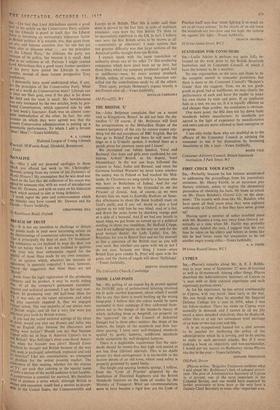THE BRISTOL `L'
SIR,—John Betjeman complains that on a recent visit to Kingsdown, Bristol, he did not hear the dis-
tinctive Of course, if Mr. Betjeman will limit his peregrinations to the Mitfordian Slopes of the western 'periphery of the city he cannot expect any- thing but the sad cacophony of BBC English. But let him go to Bristol East and there he will meet the lingo as it is U-sually spoken. I worked there as a parish priest for nineteen years and 1 know!
We christened our babies Sandra/, Vera/ and Barbara/. Our boys and girls were confirmed by our bishop, Arthur/ Bristol, or his deputy, Ivor/ Malmesbury. In the war our boys followed the colours to Asia!, India/ and Burma!: and when the Germans bombed Warsaw/ we never knew whether the enemy was in Poland or had reached the Mid- lands. At Christmas we sang carols to a Saviour who was born in Bethlehem of Judea/. And for our amusements we went to the Granada/ to see the Prisoner of Zendal. And, of course, as we were Rovers fans we went to Eastville Stadium on Satur- day afternoons to cheer the finest football team on God's earth, and if any ref. dared to give a foul against us we told him he was blind, mad or a ha/, and drove the point home by chucking orange peel or a skin of a banana/. And if we had any breath to spare when we got home we turned up at a political meeting to cheer our candidate, Sir Staffo/d Cripps. And if we suffered injury on the way we sent for the good woman doctor, the Lady Lydial. Yes, Mr. Betjeman, hie you to Bristol East and see for yourself as fine a specimen of the British race as you will ever meet. But whether you agree with me or not I do not care, because one thing 1 know—when Bristol East goes yonder St. Pete/ will open wide the gates, and the choirs of angels will shout Ilalleluja/: —Yours faithfully,
MERVYN STOCKWOOD


































 Previous page
Previous page